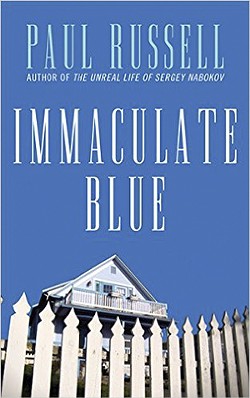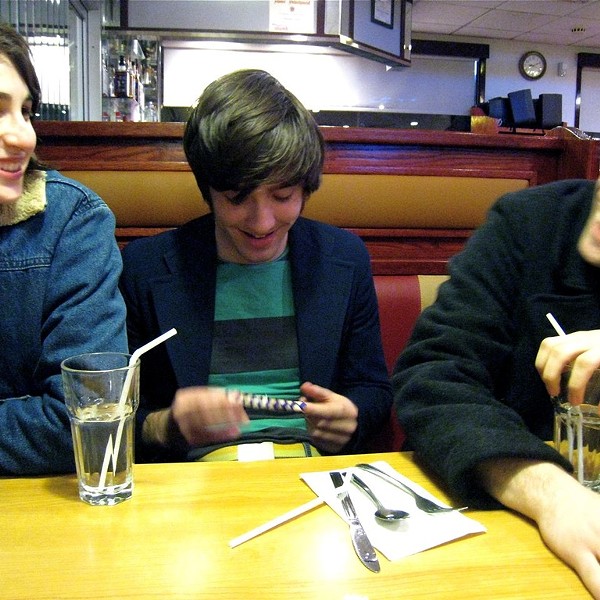A reunion is always good for revelatory drama, particularly a reunion centered around the wedding of two middle-aged men, along with their families, and some frenemies. Of course sparks will fly. But one of the unexpected delights of Vassar professor Paul Russell's intense and erotic Immaculate Blue is where the real heat comes from. Yes, you've got befuddled elders, resentful siblings, and a catty, jealous coterie, but they're merely supporting players. The notable action rises from riveting fascinator, Chris. Since he abandoned his record store/hangout Immaculate Blue a quarter century before, no one has seen or heard from him, but to everyone's surprise, Chris accepts an invitation and flies in from the nightmarish oil fields of Nigeria to rejoin his crew in Poughkeepsie. Even he doesn't quite know why he's compelled to come to the wedding of old (former?) friend Anatole and Rafa, Anatole's rock of a partner. Although cruel, cynical, and inwardly violent, Chris is sympathetic, even sexy; as he grasps his own intent, so do we. It's an unpredictable, wholly satisfying ride.
Anatole and longtime friend Lydia (she's the one who tracked down Chris) have done well. Immaculate Blue is set in 2012, and the shadow of the AIDS crisis lingers. Chris managed to miss that, but Anatole's salon business, managed by Lydia, is thriving, and Lydia and her politically conservative husband have raised a beautiful 17-year-old son, Caleb, who beguiles Chris. Caleb is a hearing-disabled drummer and the only character who vociferously objects to Chris's present life as an "independent contractor" in places like Iraq and the Niger Delta. Their conversations give Chris an opportunity to describe life far away from the First World. These revelations, in dialogue and flashbacks, are stunning and unforgettable. Russell shows us how Chris uses violence, adrenaline, and power to connect in a world that is creeping ever closer to our own. Chris's privileged insight—the testimony of a scarred man living where sound bites are made (and where atrocities are ignored)—resonates with frightening clarity.
Immaculate Blue is a sequel of sorts; Anatole, Lydia, and Chris first appeared in Russell's 2000 novel The Salt Point, a tale of almost-young '80s kids taking their first fitful steps into adulthood. Back then, Chris drove Lydia and especially Anatole to distraction, and some bed-hopping and bruising of hearts occurred. They all say they've moved on, but Chris's return awakens past grievances and lusts, occasionally indistinguishable.
By moving point of view from character to character, often from paragraph to paragraph, Russell achieves piercing intimacy with all his players. All get their say, both inwardly and outwardly, and each voice is distinctive. Refreshingly, almost every fiftyish character is at peace with what time has done to his or her body; even though flesh is no longer taut, and certain organs do not function as they once did, Russell's loving prose renders all bodies beautiful, ennobled, and often devastatingly erotic. Pot bellies, faded tattoos, and half-erections never had it so good.
While Immaculate Blue spends ample time in the shadows, the novel emerges as a defiant dance of life, a guiltless doubling down on sensual pleasure as the Grim Reaper edges ever nearer and middle age settles in. What simpatico souls will be at your side when you cross those thresholds, and what will they inspire you to do? Although they are deeply flawed, you could do a lot worse than the characters in Immaculate Blue.
















